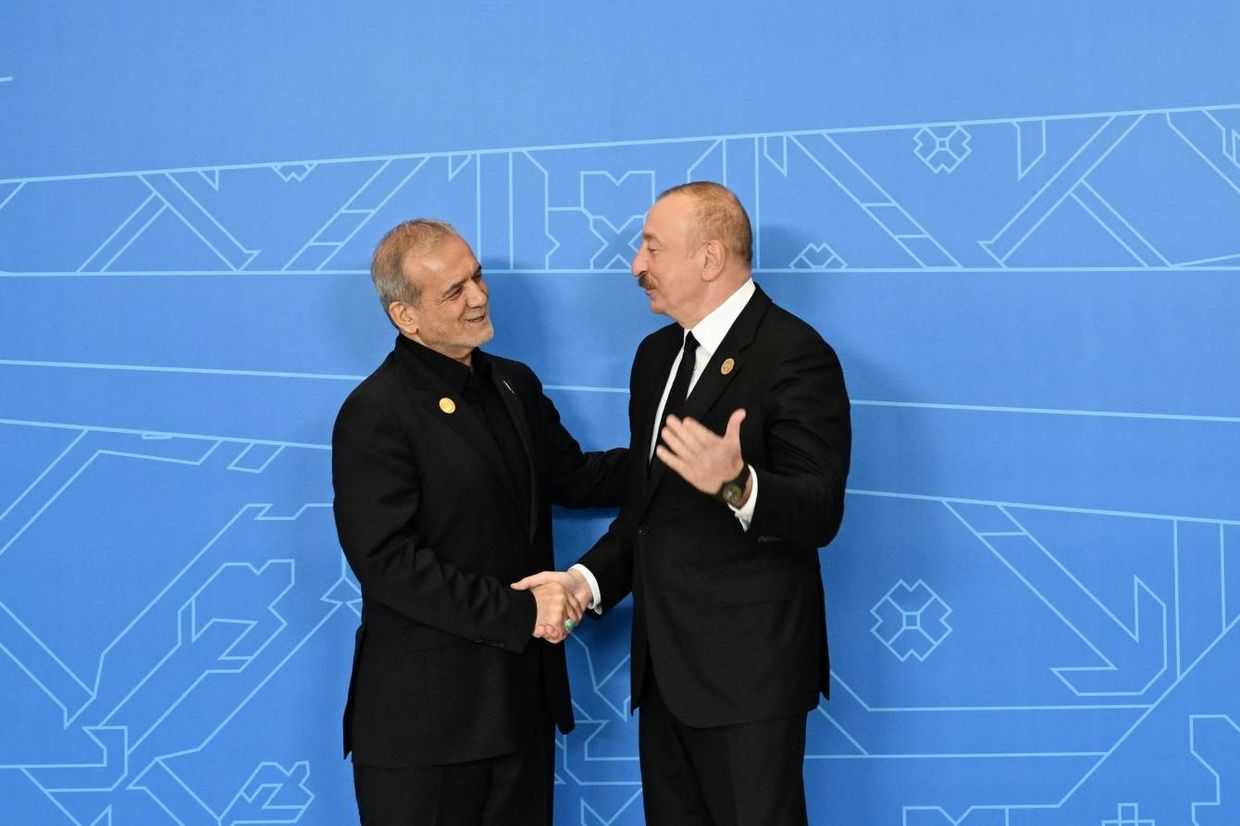
Despite a treaty on ‘Allied Interaction’ signed a day before Russia’s invasion of Ukraine, Azerbaijan has remained resolutely neutral on the conflict.
A day before the Russian invasion of Ukraine, Azerbaijani President Ilham Aliyev met with his Russian counterpart Vladimir Putin in Moscow, where the two signed the 43-point Declaration of Allied Interaction that guarantees mutual support between the two countries across a variety of sectors.
The declaration aims to ‘elevate’ the relationship between Russia and Azerbaijan to a ‘qualitatively new, allied level’, according to the Azerbaijani Ministry of Foreign Affairs.
It was apparently based on several previous agreements signed between the two countries over the past two decades and covered bilateral cooperation in both economic and cultural spheres, with its heaviest emphasis on military cooperation.
A question of neutrality
Throughout its articles, the declaration stipulates that Russia and Azerbaijan would adopt similar positions on international issues of interest to both parties, highlighting that both countries would ‘resolutely prevent’ the activities of organisations and individuals against each country’s respective sovereignty and ‘territorial integrity’.
The agreement does not specify, however, a direct recognition of Russia’s current claim on Crimea, which it annexed from Ukraine in 2014 or Azerbaijan’s claim over Nagorno-Karabakh — whose status remains contested since 1991, and which has been under the auspices of a Russian peacekeeping mission since the end of the Second Nagorno-Karabakh War in 2020.
Additionally, the document affirms the intention of both countries to co-develop modern weaponry and military equipment, while also maintaining the possibility of providing direct military assistance to each other on the basis of the UN Charter and separate international agreements.
The declaration goes on to reaffirm Russia’s intention to maintain a peacekeeping force in Nagorno-Karabakh, with Azerbaijan expressing its appreciation for the role Russia had played as a mediator in the Second Nagorno-Karabakh War.
Some observers and analysts expressed dismay at the declaration, claiming that it strips Azerbaijan of its status as a ‘neutral country’.
‘Although they do not admit it, this is the main spirit of the signed document’, Azer Gasimli, political and director of the Institute of Political Management, told OC Media on February 23.
‘The main source of current international problems is Russia’s illegal steps and aggressive policy,’ said Gasimli. ‘Now, the whole world will call Putin an aggressor, impose sanctions on Russia, expel it from international organisations — and Azerbaijan will have to support Putin.’
In the weeks since the war began, Azerbaijani officials have maintained a quiet and neutral stance on the conflict, with muted statements even when Russian shelling damaged Azerbaijan’s honorary consulate in Kharkiv. Azerbaijan has also sent repeated shipments of humanitarian aid to Ukraine.
Whose interests does the treaty serve?
Ali Karimli, chair of the opposition Popular Front Party told OC Media that the declaration ‘serves the interests of Russia’ and that Azerbaijan ‘did not need it’.
Karimli found fault within the articles that outline joint military ventures with Russia, stressing the importance of moving away from the Russian sphere of intelligence, and reducing military dependence on it.
‘Throughout several articles [of the document], the declaration allows Russia to deploy its army in Azerbaijan under various pretexts — of course, with the consent of the Azerbaijani government’, Karimli said.
Karimli further criticised Aliyev’s untimely visit to Moscow — between Russia’s recognition of Luhansk and Donetsk and its invasion of Ukraine.
‘I am sure that Russia has chosen the date of the signing of the declaration’, speculated the opposition leader. ‘Russia then knew it would […] start a war against Ukraine and therefore be completely isolated internationally. For this reason, Putin postponed the signing of this document to show that he was not alone’.
Despite steps Baku has taken to distance itself from the Kremlin’s policy, such as the humanitarian aid sent to Ukraine, Karimli pointed out that the future of a conflict closer to home, the Nagorno-Karabakh question, was purely in Russia’s grasp.
‘Armenia does not recognize our territorial integrity, which allows Russia to ignite the conflict at any time. Russia has deployed its army in Karabakh, albeit in the name of peacekeeping, and with the alliance declaration, has created legal opportunities for itself to find an excuse to deploy its army in Azerbaijan with a wider contingent.’
On the other hand, Zardusht Alizade, a political analyst and former opposition figure, believes that the declaration contains no provisions that are inherently run counter to Azerbaijan’s interest, and that it ‘lays the groundwork for the further strengthening of Azerbaijan’s position in the region’.
‘This declaration has one purpose: it is a step taken by Azerbaijan to ensure its national security and recognition of its territorial integrity. Just as the Shusha Declaration was signed with our closest ally, the Republic of Turkey’.
Alizade shrugged off any connection between the signing of the treaty and the invasion of Ukraine the following day.
‘This declaration is not aimed at any state, it is just a document that serves the rise of Azerbaijan’.






